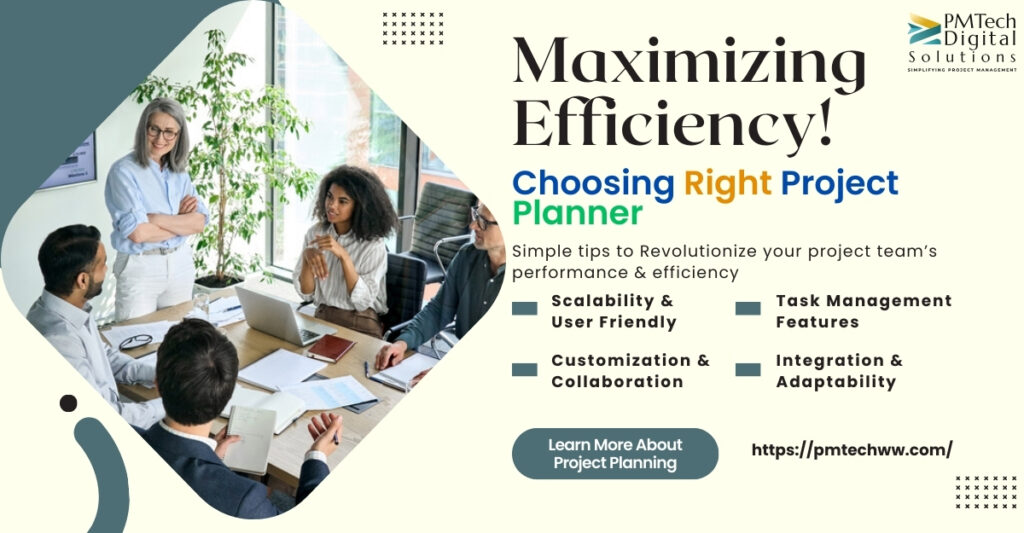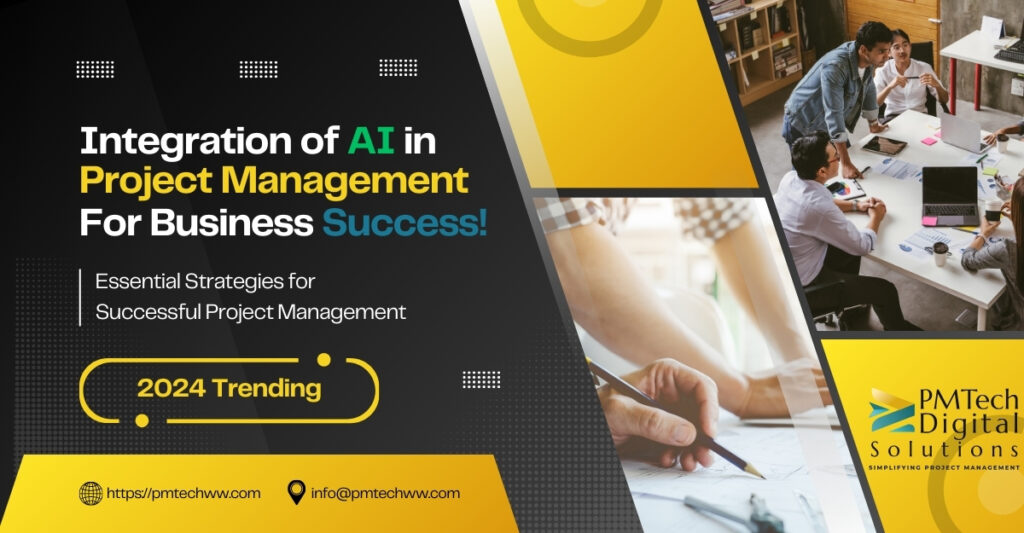Maximizing Efficiency: Choosing the Right Project Planner for Your Team

Reading Time: 13 minutes Looking for the ideal project planner? It’s all about finding the tool that not only organizes tasks and project scheduling but propels your team towards successful project completion. In this article, we dissect the vital features, cost implications, and varying scales of today’s leading project planning tools to help you pinpoint the perfect match for your workflow—without the fluff. Be sure to check the features and details of the project planners discussed. Key Takeaways Choosing the right project planner hinges on evaluating the scale and complexity of projects, essential features for efficient task and resource allocation management, and budget considerations, ensuring that the planner can scale and integrate with various roles, tasks, and resources. An effective project plan requires clear objectives, an organized system for managing tasks and deadlines, and robust tracking of progress and time management, utilizing tools like Gann charts, built-in reports, and dynamic tracking for real-time insights and better decision-making. Modern project planners should offer digital and physical options, user-friendly interfaces, eco-conscious materials, customizable functionalities, seamless integration with other tools, and adaptability to workflow changes and project management evolution. Understanding Your Project Planning Needs When it comes to managing projects, having the right tools and resources is crucial for success. A project planner is an essential tool for project managers, designers, writers, and individuals who prefer to keep tasks and plans organized. Before choosing a project planner, it’s essential to understand your project planning needs. Consider the size and complexity of your projects, the number of team members involved, and the level of detail required. Do you need a planner that can help you track progress, assign tasks, and set deadlines? Or do you prefer a more straightforward approach to planning and organizing your projects? Choosing the Perfect Project Planner Choosing the right project planner is critical, much like appointing a trusted captain to steer your ship amidst the unpredictable waters of deadlines, tasks, and teamwork. Project managers know well the comfort that comes with having an efficient planner at their disposal to orchestinate every moving part. Despite being spoilt for choice in a marketplace brimming with options—each claiming to be the ultimate solution for project challenges—the following have emerged as popular choices among planning tools: Trello Asana Monday.com Jira Microsoft Project. Given that these platforms each boast distinctive features and advantages, it’s crucial to assess them against the particular requirements of your own projects. The question remains: how can you sift through this abundance and select one that seems tailor-made for your needs? Scale of Your Projects Take into account the magnitude of your projects. Are they more akin to a small boat or a massive naval vessel? The complexity and breadth of your tasks will depend on each other and determine the kind of planner necessary for success. Smaller teams with simple duties might find that a basic Planner app is adequate, but expansive, multifaceted projects require an advanced system capable of managing varied needs and delivering detailed plans. It’s not just about how many tasks there are. It’s also essential to consider roles, responsibilities, resource allocation, and available resources when choosing a planner. Your chosen tool must effortlessly transition from handling basic checklists to supporting complex operations at an organizational level. Essential Features for Task Management The essence of managing tasks efficiently is found in functionalities that simplify your daily routine by paying attention to details and time management. Being able to distinguish urgent tasks from those less critical is crucial. Your planner needs to enable you to pinpoint pivotal tasks while recognizing which ones can be relegated for later attention. It should provide an overarching perspective on the interrelations between tasks so that you can foresee potential obstacles and adeptly steer clear. A project lacking these essential tools can be likened to a vessel bereft of its navigational instrument—a compass—left at the mercy of unpredictable shifts and changes. Price Considerations Finally, it’s crucial to address the monetary considerations. Consider your budget as a beacon steering you clear of fiscal disaster. Creating a financial plan involves looking beyond just the purchase price—it encompasses the complete cost from acquisition through upkeep and necessary upgrades over time. You need to meticulously evaluate each prospective outlay so that the planner meets expectations without causing unexpected expenditure excesses. As an experienced navigator would, plot your financial route with full awareness of all costs involved. Types of Project Planners There are various types of project planners available, each with its own unique features and benefits. Here are some common types of project planners: Digital Project Planners: These are software-based planners that can be accessed online or through mobile apps. Examples include Microsoft Project, Trello, and Asana. Digital project planners offer flexibility, collaboration features, and automatic updates. Paper-Based Project Planners: These are physical notebooks or binders that provide a tactile approach to planning and organizing projects. Examples include the Large Project Planner, Moleskine PRO Project Planner, and Meeting Notebook for Work Organization. Paper-based project planners offer a more traditional approach to planning and can be useful for brainstorming and note-taking. Hybrid Project Planners: These combine the benefits of digital and paper-based planners. Examples include planners with digital templates and paper-based notebooks with online syncing capabilities. Hybrid project planners offer flexibility and convenience. Specialized Project Planners: These are designed for specific industries or projects, such as construction, event planning, or software development. Examples include project planners with Gantt charts, Kanban boards, or Agile templates. Specialized project planners offer tailored features and formats for specific project needs. When choosing a project planner, consider your project planning needs, personal preferences, and the level of complexity involved. By selecting the right type of project planner, you can streamline your project management process, increase productivity, and achieve your goals. The Anatomy of an Effective Project Plan After choosing the perfect planner, embark on constructing a project plan that serves as more than merely a checklist of tasks. It is an essential navigational chart steering your team from the starting point to finalization. This blueprint
Maximizing Project Success: Integrating AI and Project Management

Reading Time: 15 minutes How does integrating AI into project management reshape the role of today’s project professionals? Artificial intelligence is no longer a futuristic concept but a practical tool redefining project management paradigms and augmenting project management capabilities. AI’s analytical prowess aids in laborious tasks, fuels strategic decision-making, and analyzes historical data to improve forecasting accuracy and understand risks. This article explores the evolving landscape of AI and project management, pinpointing advancements, practical tools, and the synergy between human skills and AI that promises to enhance project outcomes without overpromising or overwhelming you with jargon. Introduction to AI in Project Management Artificial intelligence (AI) is revolutionizing the field of project management, transforming the way projects are planned, executed, and delivered. Project managers are increasingly adopting AI-powered project management tools and software to enhance collaboration, improve project outcomes, and streamline processes. These advanced tools leverage AI’s capabilities to automate routine tasks, provide predictive analytics, and optimize resource allocation, allowing project managers to focus on strategic decision-making and creative problem-solving. As AI technology continues to evolve, it is essential for project managers to understand the benefits and challenges of AI in project management. Embracing AI can lead to more efficient project execution, better risk management, and improved overall project success. However, to fully leverage AI’s potential, project managers must develop the necessary skills to interpret AI-generated insights and integrate them into their project management strategies. Key Takeaways AI is revolutionizing project management by automating analytical and administrative tasks, thus allowing project managers to focus on strategic and creative aspects of project execution, despite only 21% currently utilizing AI technologies. Advanced AI tools enhance project planning through intelligent forecasting, dynamic scheduling, and optimized resource allocation, resulting in more robust, adaptable projects and improved efficiency and project outcomes. The synergy between AI and human skills in project management fosters a collaborative environment where routine tasks are automated, enabling project managers to concentrate on judgment-based work and strategic leadership while emphasizing the importance of ethical considerations and human oversight in AI integration. Navigating the AI Revolution in Project Management The revolution of artificial intelligence within the realm of project management is already reshaping our approach to task management, decision-making processes, and goal fulfillment. Integrating AI into project management strategy involves identifying weaknesses, setting goals for AI implementation, and tracking metrics to ensure success. The sentiment among 77% of professionals in project management is one of optimism regarding AI’s influence on their work sphere. This highlights that artificially they see intelligence as an influential force rather than a fleeting trend. As they adjust to a new reality where artificial intelligence manages both complex analytics and routine tasks, project managers are discovering opportunities to focus more on strategic thinking and creativity within their roles. Despite this shift towards embracing AI’s potential benefits in managing projects, with merely 21% actually implementing it so far indicates that there’s still much progress to be made before its use becomes widespread. Decoding AI’s Role in Project Management At the heart of project management, AI is revolutionizing the approach by taking over tasks that are analytical and administrative in nature. AI tools can enhance project management skills such as communication, collaborative leadership, and problem-solving. This shift liberates project teams to invest their efforts into strategic work that propels projects towards success. In this domain, artificial intelligence displays a vast array of capabilities, including: Machines with reactive abilities Machines possessing proactivity Systems characterized by limited memory Theory of mind machines Self-aware systems These various forms of AI contribute distinct advantages to the realm of project management. Within this landscape, machine learning stands out as a significant branch of AI. It relies on using data coupled with algorithms to enhance how tasks are performed without being directly programmed for each task—laying down an evolutionary path for more intelligent project management tools and methods. Empowering Project Managers with AI Tools Project managers are experiencing a significant boost in productivity and the caliber of their results thanks to AI tools, which assist project managers in tasks such as communication, collaborative leadership, problem-solving, and strategic thinking. These tools aid with intricate responsibilities like scheduling, cost estimation, resource allocation, and risk management. The introduction of AI is enhancing efficiency within projects and providing data-driven insights that were once unattainable. As these individuals integrate such tools into their routine tasks, they discover how AI’s integration into project management software is revolutionizing their everyday processes. This technology enables better utilization of resources while simultaneously honing focus on the objectives set for each project. AI-Driven Decision Making In the realm of project management, AI has significantly enhanced decision-making capabilities. It leverages predictive analytics to provide a robust, data-driven basis for critical choices that heavily influence the outcome of a project. By sifting through and analyzing vast amounts of project data, AI is capable of identifying patterns and projecting future risks, thus offering valuable insights. These enable project managers to: Confidently tackle complex aspects within their projects Make decisions rooted in solid data Meet prospective challenges head-on with preventive solutions. Strategically distribute resources and streamline timelines for better efficiency. Augment overall rates of success and elevate performance metrics. Consequently, this leads to an advanced methodology in project planning that proactively addresses potential issues by integrating comprehensive strategies designed for achieving successful results in any given venture. Enhancing Project Planning with AI The emergence of artificial intelligence has significantly transformed the domain of project management, introducing sophisticated capabilities such as intelligent forecasting, enhanced resource allocation efficiency, and flexible scheduling. These advancements in AI tools and methodologies go beyond merely boosting productivity. They are fundamentally altering the success rates of projects. By enabling real-time processing of large datasets and facilitating instantaneous modifications to plans, AI empowers project managers with unprecedented adaptability and resilience for their strategies. This ensures that managers can maintain robust control over the complex dynamics inherent in modern projects. Intelligent Forecasting & Risk Assessment AI-powered tools for forecasting and evaluating risks are providing project managers with a semblance of prescience, allowing them to
Leadership in Project Management: Essential Traits of an Effective Project Leader

Reading Time: 12 minutes What sets apart an effective project leader from the rest? The answer lies in the specific traits and qualities they possess. In this post, we will delve into the key attributes that define a successful project leader in the realm of project management.
